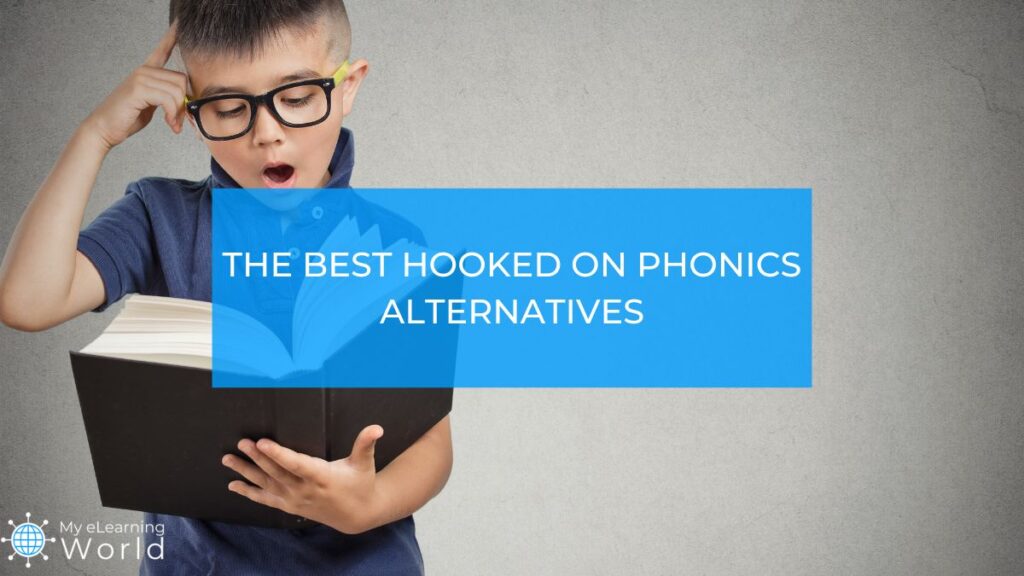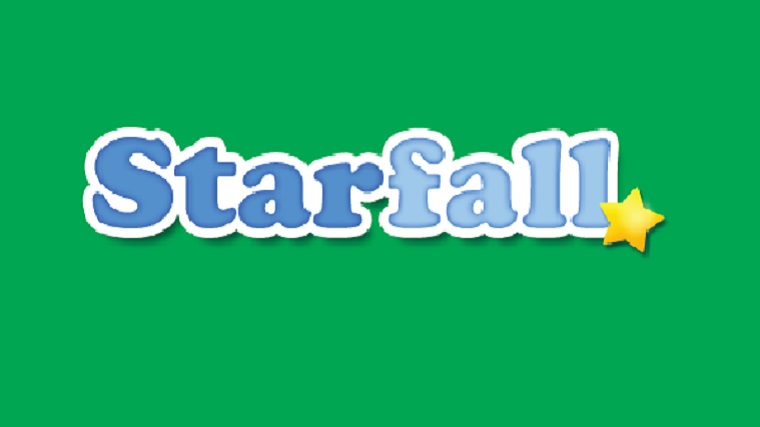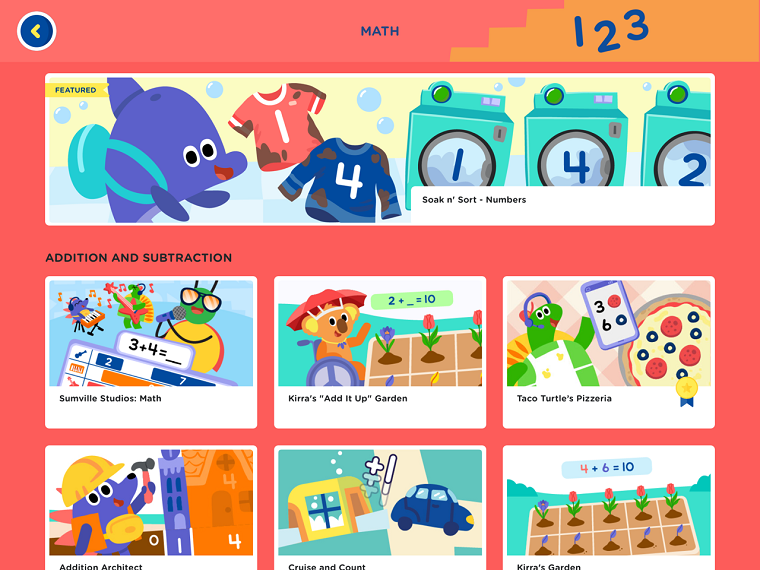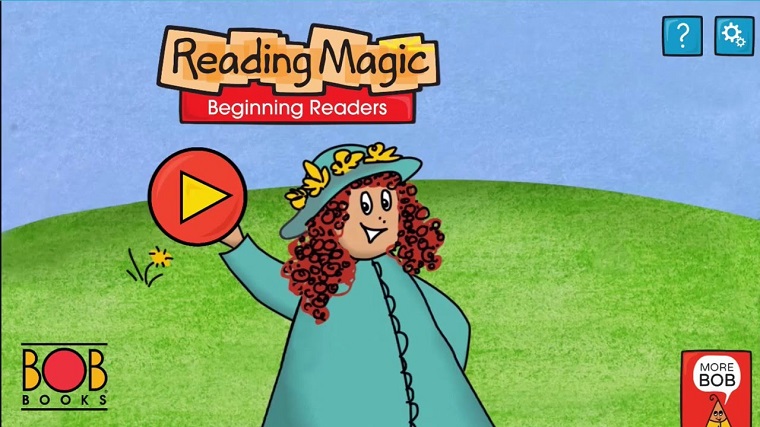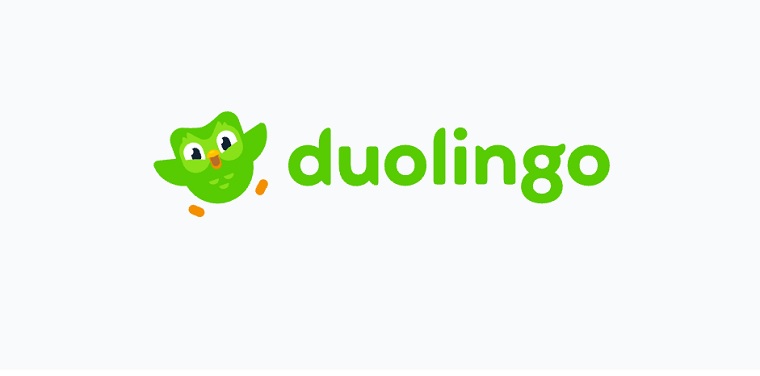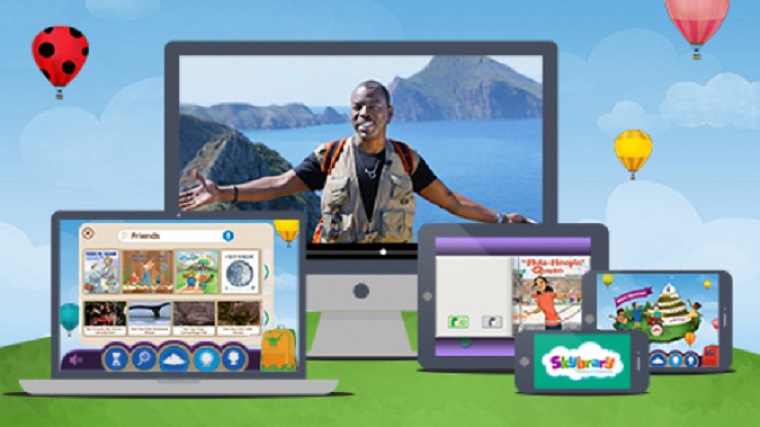With the best Hooked On Phonics alternatives, you can provide your child with a comprehensive education that helps them to become the best reader and learner they can be.
These days, there are tons of fantastic reading apps and programs that make it easier than ever before for kids to start reading and become lifelong learners.
With proper guidance and healthy boundaries, technology can become your ally in education and a wonderful tool to help your child learn and grow, making their screen time meaningful and useful.
While you want to ensure that “screen time” does not become the primary tool for your child’s learning, using creative ways to encourage your child’s reading development based on their learning style can help them become more confident readers.
One of the pioneering companies in helping students learn how to read is Hooked On Phonics. Originally a company that sent a monthly subscription box with printed workbooks, sight cards, and phonics books, Hooked On Phonics has since expanded to incorporate online learning technology.
Their tried-and-true learning methodology of over 35 years is still the same, but the tools now include online content on the computer or on an app for a truly blended learning approach.
With the concept of incremental learning and with the help of tools like workbooks, reward stickers, and on-the-go apps, Hooked on Phonics has aligned its traditional printed content with the online interactive components and offers different ways to keep your student engaged and excited about learning.
As a top platform for learning how to read, Hooked On Phonics has established itself as the household name for families with young children helping their little ones get started with letter recognition and reading.
But while Hooked On Phonics is certainly one of the most popular reading programs out there, it might not be for everyone. Maybe the teaching method just doesn’t gel with your kid, or maybe you think it’s a little too expensive.
Fortunately, there are many excellent Hooked On Phonics alternatives that offer great features and learning potential to help your child learn how to read.
Disclosure: Some of the links in this article are affiliate links, meaning at no additional cost for you, we might get a commission if you click the link and purchase.
Recommendations You Can Trust
We take our recommendations seriously, especially when it comes to educational apps for children. We understand that parents and caregivers want reliable and effective tools to support their child’s learning journey.
Here’s why you can trust our selections for the best alternatives to the Hooked On Phonics app:
- Extensive Testing: To ensure that we provide you with accurate and insightful recommendations, we put in the time and energy to do hands-on testing of all the most popular apps available. We have a team of experts that includes parents and professionals in the education field, who personally test out each app. We also get our own children to test these apps so we can see what the target audience really thinks. After all, who better to judge the effectiveness of a children’s app than the children themselves?
- User Reviews and Ratings: We recognize the importance of user feedback in evaluating the quality of educational apps. That’s why we meticulously scour user reviews and ratings for each app on our list. This lets us gather a wide range of opinions to help us figure out which apps for building reading skills are truly a cut above the rest.
- Educational Expertise: Our team is composed of professionals from various fields within the education sector, including teachers, instructional designers, homeschool educators, and more. Their expertise is key to helping us find the best products to recommend to you so your child can develop their reading skills.
- Ongoing Updates: Educational apps are in a constant state of development, with new releases and updates emerging regularly. We are dedicated to regularly revisiting and refreshing our recommendations to make sure they’re timely and accurate. This ensures that you can rely on us to deliver the most recent and highly effective alternatives to Hooked On Phonics.
What are the Best Hooked On Phonics Alternatives?
Here are our picks for alternatives to Hooked On Phonics that deliver excellent results.
1. Reading Eggs
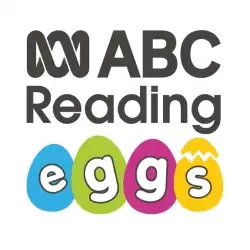 Reading Eggs
Reading Eggs
Reading Eggs captivates children with its engaging online reading games and activities, making the process of learning to read enjoyable. The combination of interactive elements like games, songs, and rewards not only keeps kids motivated but also instills a sense of pride in their reading achievements!
Reading Eggs was founded in 2008 and is well-known due to its extensive TV marketing in the past. The talking egg character is memorable and catchy. Reading Eggs goes far beyond marketing and gimmicks, though. As of today, it has been effectively used to learn how to read by over 20 million children in 170 countries.
What makes Reading Eggs so successful is their incorporation of witty characters, various interactive games to reinforce taught concepts, and funny songs to sing along as you learn. Your young learners will remember learning the suffix “-ant” simply by playing a game where an ant is running on a treadmill, jumping over the right letters, and singing a hilarious song. It’s such a fun and effective way to build reading skills.
Reading Eggs is built on learning mastery teaching concepts, where students progress as they learn to master a specific skill set. There are also various groups of activities (or “clubs”) based on a blend of age groups and skill levels: Reading Eggs Junior focuses on letter recognition and phonics, while Reading Eggspress is geared toward 7-13-year-olds. Your children will love to read with Reading Eggs.
Key Features
- Best suited for students ages 2-13
- Fun games and activities to learn phonics and reading
- Interactive E-books
- Additional resources for parents and educators
- Settings to customize for accent and regional spelling
- Compatible with PC, Apple, and Android devices
- Reading comprehension assessments
- New feature: a reading journal to check comprehension and help students engage with books
Pricing
You can try out Reading Eggs for free for 30 days (for up to 4 children per family). After that, Reading Eggs pricing is $9.99/month for a monthly subscription or $5.83/month for an annual membership (billed at $69.99 once for the entire year).
2. Epic!
Epic! offers your students access to an online library of over 40,000 age-appropriate books at their fingertips. This includes audiobooks in different genres, such as fairytales, action, adventure, or non-fiction subjects, to supplement their curriculum and foster their curiosity while learning.
Based on their interests and reading level, students can choose different books, create reading lists or “virtual bookshelves,” and receive recommendations based on books they enjoyed reading in the past.
This platform makes curriculum planning a breeze, as well, since Epic! helps you create your student’s reading list based on the particular study area in seconds.
Whether your student is learning about mammals or wants to know more about dragons, Epic! will be your ally in setting up the appropriate e-books in the queue.
Epic! partners with Scholastic and PBS, as well as other collaborators, to curate and catalog printed books for everyday access and easy searchability.
Key Features
- Book recommendations based on interests and key phrases
- 24/7 personal library access
- Easy to use for parents and educators to assign reading and monitor progress
- Different tools to help students with vocabulary, spelling, and proper word usage
- Reading comprehension quizzes
- Multisensory blended reading (visual and audio)
Pricing
Epic! comes with a 7-day FREE trial. After that, you can choose to continue Epic! for $11.99/month (billed monthly) or subscribe for an annual membership at $59.99 a year. Our Epic pricing guide has more details.
3. Starfall
Starfall is a fun and exciting platform geared towards children from pre-K level through 3rd grade, with two-level distinctions (Pre-K and K, and 1st-3rd grade).
While your student can learn how to read on Starfall, the platform offers other subjects, such as writing, math, and science.
Because of that, Starfall is widely used within the homeschooling community, either as a curriculum supplement or a standalone curriculum for younger grades.
Starfall is also used with great success in many public schools offering ELD, ELL, and ESL services for children with English as a second language and for those with learning disabilities. This is because the founder of this platform was struggling with dyslexia.
Therefore, as a student, he created Starfall to offer untimed, multisensory learning for students who might learn differently and to help everyone succeed.
Key Features
- Developed for children ages 3-8
- Complete Language Arts and English curriculum for Kindergarten and 1st grade
- Good way to teach phonics, letter sounds, phonemic awareness, and key early reading skills
- Offered for PC, Android, and iOS platforms
- Easy navigation with colorful icons sorted by age, subject, and interest
- Fun seasonal activities for major holidays
- Playful learning of grammar, sentence structure, and spelling
- Great way to build reading skills
Pricing
Starfall is a 501(c)(3) nonprofit organization with a $35/year membership.
4. HOMER
For your budding readers of ages 2-8, HOMER is an incredible online platform that teaches students how to read through fun activities and interactive games.
In fact, HOMER has been shown to improve early reading scores by 74% and build reading confidence in kids! It’s one of the best tools for teaching reading that we’ve found.
That’s why we consider HOMER to be the one of the best Hooked On Phonics alternatives out there today.
Tapping into their interests, HOMER has many topics to choose from, whether it’s animals, princesses, dragons, or pirates. Students will use their imagination to explore the world of reading through fairytales, stories, and relatable characters.
Your students will be immersed in fun worlds and learn reading while going on reading and imagination adventures.
You, as their educator, have access to the curriculum progress and planning to ensure your student is never bored or over-challenged, as either situation can lead to frustration and inhibit the learning journey’s success.
HOMER places your student at their appropriate reading level and adjusts their curriculum based on your student’s academic growth, which makes each student’s learning journey on this platform unique.
Key Features
- Choose from over 1,000 activities to build reading skills and more
- Can be used as a complete curriculum for younger ages, as it includes subjects such as reading, math, social and emotional skills, thinking skills, and creativity
- In-depth reading program for teaching kids
- Fully customizable, interest-led learning experience
- Various relatable trademark characters
- Best suited for young readers ages 2-8.
Pricing
HOMER pricing across its 2 plans is as follows:
- Monthly Plan: $12.99 per month
- Annual Plan: $79.99 per year
Click here to try HOMER free for 30 days.
5. Bob Books Reading Magic App
Bob Books are a “not-so-secret” best-kept secret among parents, educators, and librarians.
Nearly as popular for emergent learners as Dr. Seuss books, Bob Books have proven to be an incredibly effective tool for learning how to read.
The printed version consists of a boxed set of mini-boos that focus on phonics, letter recognition, shape recall, story-telling with images, and rhyming. Each book has a specific letter, prefix, or suffix focus, and the books become increasingly more challenging while giving the student confidence by celebrating their reading success book-by-book.
Bob Books Reading Magic App is a direct extension of the company’s book program.
Bringing the successful Bob Books concept onto an online platform adds an interactive component to the paper book reading experience.
The Bob Books Reading Magic App is one of the top downloads for emergent readers, as it helps your child learn how to read in days, simply through playful interaction.
Key Features
- Drop-and-drag activities
- Sounding out words and phrases
- Well-known and -loved animations
- Each story covers wholesome values
- Four different reading stages (pre-reader to developing reader)
- Available as Apple or Amazon app
Pricing
The app costs $2.99 and can be downloaded in the Apple App Store or on Amazon Apps (for tablets)
6. Duolingo
Bonjour! Learning reading skills in another language helps your student in many different ways!
Whether your child is interested in simply learning a new language, or you are planning a trip to a foreign country and want your child to be able to converse, speaking a second language helps with your student’s primary language skills development.
It also helps them in other areas of their academics since it affects their brain development in a positive way.
Duolingo is a fun interactive online platform that helps your student practice and playfully expands their foreign language skills. With over 100 courses in over 40 languages, Duolingo has many options to choose from.
Duolingo offers the “classic” mainstream top languages, such as French, Spanish, and German, but it also offers more “exotic” options, such as Navajo and Yiddish.
Your student can access their learning account via the app for on-the-go lessons or log in on the desktop for a stationary in-class experience. Duolingo motivates its learners with tokens and a visual “level-up” structure. They also send daily progress reports and reminders based on individual learning goals you can set for your students (or which they set for themselves). Because the idea is to access the learning platform daily, it also establishes routine and healthy learning habits.
Key Features
- Motivating “gaming-style” reward concept
- Placement tests
- Option for classroom management setup (assignments, progress, etc.) for educators of multiple students
- User-friendly mini sessions to avoid overwhelm and keep students engaged
- Certifiable AI-based English language skills test, especially useful for ESL learners
Pricing
Duolingo is free for individual and even class use due to its ad sponsor usage. For those who’d rather have an ad-free learning experience with unlimited “hearts” (for uninterrupted learning), Duolingo now offers a Super Duolingo subscription.
7. Skybrary
Skybrary is an online library of curated content that blends ebooks with video content for a multimedia learning experience.
You won’t have to go to the local library to get books any longer: the Skybrary opens up endless possibilities for learning, no matter where you are.
This platform is perfect for traveling families and online learners with limited access to traditional libraries.
Skybrary offers an immersive multi-sensory experience for your learners beyond just reading a book. Your child will be able to engage with the storyline in different ways, whether listening to the audio, playing a game, watching a video that explains different concepts, or interacting with the animations within the books.
Hundreds of books are available, with more being added regularly.
Key Features
- Field trips with LeVar Burton (from PBS Reading Rainbow)
- Interactive animations
- Storytime options (audio)
- Parent dashboard
- Interactive activities
Pricing
The first month of Skybrary is free. After that, you can choose a $4.99/monthly subscription or the annual membership at $39.99/year.
A Final Word on the Best Hooked On Phonics Alternatives
With the best Hooked On Phonics competitors, you can help your child on their learning journey by giving them the proper tools to succeed.
With online learning platforms like those shared above, your child will be an avid reader in no time, and teaching reading to them will be a breeze!
Remember, many of these programs offer free trials, too, so make sure you check out a few of them to find the one that’s the best fit for your family.
Have any questions about our guide to alternatives to Hooked On Phonics? Let us know by commenting below.

